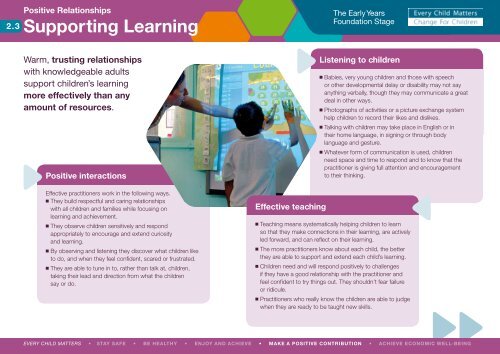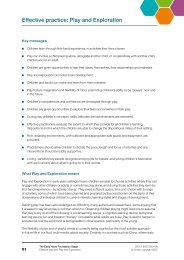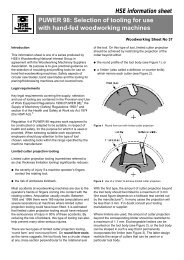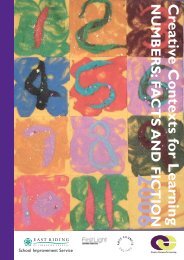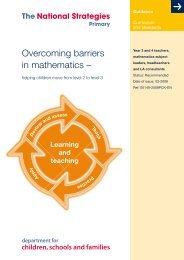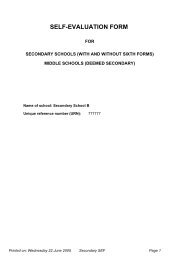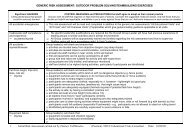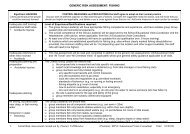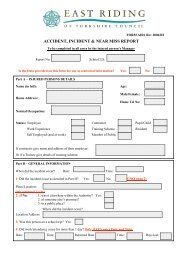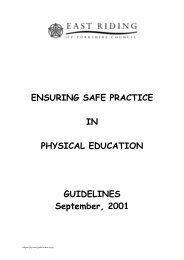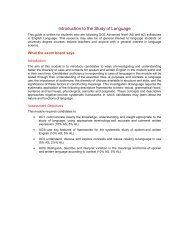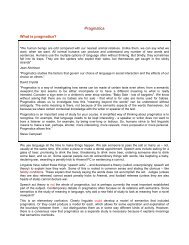Positive Relationships: Learning - Early Years Matters
Positive Relationships: Learning - Early Years Matters
Positive Relationships: Learning - Early Years Matters
You also want an ePaper? Increase the reach of your titles
YUMPU automatically turns print PDFs into web optimized ePapers that Google loves.
2.3<br />
<strong>Positive</strong> <strong>Relationships</strong><br />
Supporting <strong>Learning</strong><br />
The <strong>Early</strong> <strong>Years</strong><br />
Foundation Stage<br />
Warm, trusting relationships<br />
with knowledgeable adults<br />
support children’s learning<br />
more effectively than any<br />
amount of resources.<br />
<strong>Positive</strong> interactions<br />
Listening to children<br />
<br />
■ Babies, very young children and those with speech <br />
or other developmental delay or disability may not say<br />
anything verbally, though they may communicate a great<br />
deal in other ways.<br />
■ Photographs of activities or a picture exchange system<br />
help children to record their likes and dislikes.<br />
■ Talking with children may take place in English or in <br />
their home language, in signing or through body <br />
language and gesture.<br />
■ Whatever form of communication is used, children<br />
need space and time to respond and to know that the<br />
practitioner is giving full attention and encouragement <br />
to their thinking.<br />
Effective practitioners work in the following ways.<br />
■ They build respectful and caring relationships <br />
with all children and families while focusing on <br />
learning and achievement.<br />
■ They observe children sensitively and respond<br />
appropriately to encourage and extend curiosity <br />
and learning.<br />
■ By observing and listening they discover what children like<br />
to do, and when they feel confident, scared or frustrated.<br />
■ They are able to tune in to, rather than talk at, children,<br />
taking their lead and direction from what the children <br />
say or do.<br />
Effective teaching<br />
<br />
■ Teaching means systematically helping children to learn <br />
so that they make connections in their learning, are actively<br />
led forward, and can reflect on their learning.<br />
■ The more practitioners know about each child, the better<br />
they are able to support and extend each child’s learning.<br />
■ Children need and will respond positively to challenges <br />
if they have a good relationship with the practitioner and <br />
feel confident to try things out. They shouldn’t fear failure <br />
or ridicule.<br />
■ Practitioners who really know the children are able to judge<br />
when they are ready to be taught new skills.<br />
Every Child <strong>Matters</strong> • Stay Safe • Be Healthy • Enjoy and Achieve • Make a <strong>Positive</strong> Contribution • Achieve Economic Well-Being
Setting the Standards for <strong>Learning</strong>, Development<br />
and Care for children from birth to five<br />
OK Media 02-2007<br />
00012-2007CDO-EN<br />
ISBN: 978-1-84478-886-6<br />
© Crown copyright 2007<br />
<strong>Positive</strong> <strong>Relationships</strong>: Supporting <strong>Learning</strong> – Principle into Practice<br />
Effective practice<br />
<br />
Challenges and dilemmas<br />
<br />
■ Making time to really listen to children’s views and to act<br />
on them even when they do not match adults’ views!<br />
■ Putting into practice a written policy of listening to<br />
children who are non-verbal, or who use alternative<br />
communication systems or are learning English <br />
as an additional language, when time and <br />
resources are under pressure.<br />
■ Identifying just the right moment to intervene and <br />
move children’s learning on, by perhaps joining in <br />
or asking a question.<br />
■ Motivate children to concentrate and to try several ways to make<br />
something work rather than giving up. Use encouraging, friendly and<br />
lively approaches to support children and increase their motivation.<br />
■ Model active listening when listening to children; when supporting a<br />
child who is being called names or harassed; when taking turns in the<br />
conversation; and when showing respect for what a child has to say.<br />
■ Help children build on prior learning by pitching activities, such as a play<br />
or a story, at a level that is demanding but still within the children’s reach.<br />
■ Model being a learner as you work with children. For example, “I am<br />
going to have to think hard about how to help my son get into our house<br />
because he has forgotten his key and nobody will be there to let him in<br />
the door. Can anyone help me think what I can do”.<br />
ISBN 978-1-84478-886-6<br />
KEEP, Key Elements of Effective Practice, DfES Publications, Nottingham (ref 1201-2005 G):<br />
Knowledge and understanding in order to actively support and extend<br />
children’s learning in and across all areas and aspects of learning.<br />
The <strong>Early</strong> <strong>Years</strong><br />
Foundation Stage<br />
Reflecting on practice<br />
Think about the children with whom<br />
you work.<br />
■ Do they know that you are genuinely<br />
pleased to see them all each day<br />
■ Are there some children it is harder<br />
to get to know and build positive<br />
relationships with What could you<br />
do to ensure that you get to know<br />
them better<br />
Set up a tape recorder when you are<br />
involved in a small group activity.<br />
■ Who does the most talking and <br />
what sort of talk is it<br />
■ What messages does this give the<br />
children What are the messages <br />
for your practice<br />
What do I do next<br />
• Welfare requirements are explained in full in the<br />
Statutory Framework for the <strong>Early</strong> <strong>Years</strong> Foundation Stage booklet.<br />
• Areas • CD tatum of <strong>Learning</strong> ming eu feum and quisi Development bla feuiscin henis including nulput effective<br />
practice, aciliquisse. planning and resourcing at different stages are detailed<br />
in<br />
•<br />
the Grids Practice<br />
con<br />
Guidance<br />
et nit veliquat<br />
for the<br />
duis<br />
<strong>Early</strong><br />
essectem<br />
<strong>Years</strong> Foundation<br />
niat,<br />
Stage<br />
booklet and on the CD-ROM.<br />
• <strong>Early</strong> conum Support at, quatuer<br />
information<br />
iurerosto<br />
is<br />
corper<br />
available<br />
irit lor<br />
on<br />
sequississit<br />
the CD-ROM<br />
ero<br />
under odoloreros areas of nim <strong>Learning</strong> delit. and Development.<br />
• Research and resources are available on the CD-ROM.<br />
00012-2007DOM-EN © Crown copyright 2007


